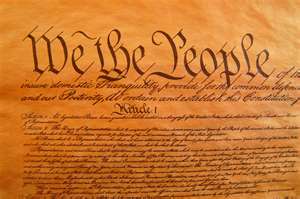We Should Be Careful That We Know What We Are Sticking To, When We Stick To The Constitution
 Like my colleague Ed Fallone, I spoke at the Marquette Constitution Day program on Monday, September 17, sponsored by the Marquette Political Science Department. We were joined on the program by Marquette Political Science professors John McAdams and Paul Nolette. The program was centered around the concept of “Sticking to the Constitution.”
Like my colleague Ed Fallone, I spoke at the Marquette Constitution Day program on Monday, September 17, sponsored by the Marquette Political Science Department. We were joined on the program by Marquette Political Science professors John McAdams and Paul Nolette. The program was centered around the concept of “Sticking to the Constitution.”
For the sake of brevity, I will simply summarize my arguments.
1. The text of the United States Constitution is more important as a symbol of our commitment to democratic government and the rule of law than it is as a source of answers to contemporary problems.
2. The United States Constitution of 1787 has lasted as long as it has because it is extremely brief and extremely vague. These characteristics allow it to be adapted to just about any position on any question, and has thus allowed significant changes to occur in the governmental structure of the United States without the need to alter the text of the constitution. Had it been more specific and detailed, it would have been repealed or substantially amended long ago.
3. The idea that the words of the Constitution have a precise and fixed meaning that transcends time has, in my opinion, led to numerous problems, including the excessive use of the judicial power, which has at times threatened to undermine the democratic process. Positing a precise meaning to imprecise phrases has too often produced the illegitimate overruling of democratically sanctioned practices.
4. A thorough understanding of our constitutional traditions and constitutional history—and I mean “constitutional” in the broad structural and institutional sense—is a better source for constitutional decision-making than a supposedly correct textual interpretation of the words of the constitutional text.
5. Continuing to refer to the members of the convention that drafted the 1787 Constitution as “the Founding Fathers” is kind of juvenile. The 55 men who showed up in Philadelphia in the summer of 1787, were important figures in their own time, and James Madison does rank as one of the foremost political thinkers of the eighteenth century. However, the delegates were not sent to the convention from the heights of Mt. Olympus, and they each had their own political agendas.
6. Had the Constitution of 1787 been rejected by the American people in 1787 and 1788, as almost happened, the course of American constitutional history would probably have been pretty much the same. The original constitution, the Articles of Confederation, would have remained in effect, and it surely would have been amended or interpreted as the needs of the present warranted.
7. President Obama’s use of military drones to assassinate our ostensible enemies (and whatever innocent civilians that happen to be standing around) is not consistent with the division of the war-making powers imbedded in the structure of the 1787 Constitution, and it is inconsistent with our constitutional traditions. If you ask me, the practice is both immoral and unconstitutional.
Because of limitations of time, on Monday I actually skipped over point #6, but it is a good point, worth making here.
